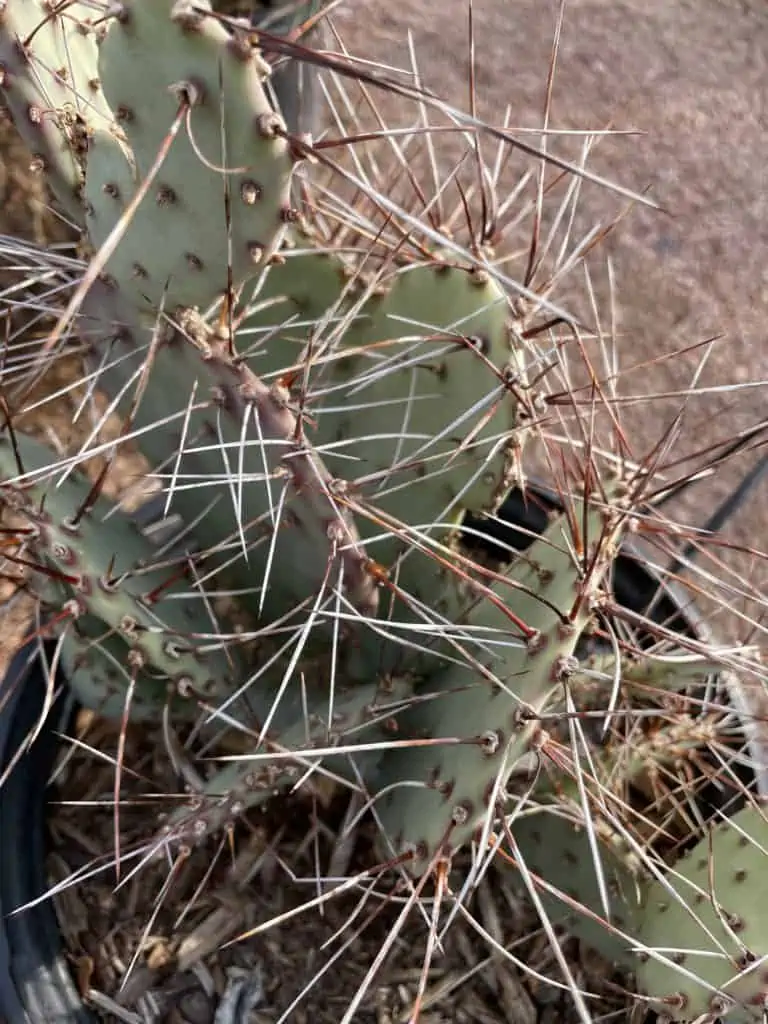Opuntia violacea var macrocentra seeds
Accepted Scientific Name:
Opuntia violacea var. macrocentra Engelm.
Synonyms:
Opuntia macrocentra, Opuntia santa-rita (sometimes used interchangeably)
Common Names:
Purple Prickly Pear, Santa Rita Prickly Pear, Violet Prickly Pear
Plant Origin:
Opuntia violacea var macrocentra seeds
Opuntia violacea var. macrocentra – The Purple Prickly Pear That Turns Heads in Every Season
Opuntia violacea var. macrocentra, widely known as the Purple Prickly Pear or Santa Rita Prickly Pear, is one of the most visually captivating cacti native to the American Southwest. Its vibrant pads, shifting between blue-green and deep violet, combined with sunny yellow flowers and edible fruit, make it a dynamic and multi-seasonal star in any desert landscape, xeriscape garden, or succulent collection. When grown from seed, this cactus offers the opportunity to raise a plant truly acclimated to your local environment, developing into a one-of-a-kind specimen over time.
This species is native to arid regions of Arizona, New Mexico, Texas, and northern Mexico, where it grows on rocky slopes, gravel flats, and sandy soils with excellent drainage. It thrives in full sun and is well-adapted to low precipitation, intense heat, and even bouts of cold, making it an outstanding candidate for USDA hardiness zones 7–10. It’s an ideal plant for those seeking resilient beauty with little maintenance required.
One of the most striking features of Opuntia violacea var. macrocentra is the coloration of its pads. The round to oval-shaped pads range in color from soft blue-green to intense purple, with the deepest violet hues developing in cooler weather or when the plant is exposed to strong sunlight. This seasonal change not only reflects the plant’s health and stress response but adds ongoing visual interest to your landscape year-round. No two plants are ever exactly alike—each one displays a unique blend of pigment depending on the microclimate in which it grows.
The cactus pads are decorated with widely spaced areoles containing short, hair-like glochids and longer, dark-colored spines that can vary in length. Despite its defensive features, the plant maintains a graceful, sculptural form that looks stunning in both formal and naturalistic gardens. Its growth habit is typically upright and spreading, and over time it can form broad clumps reaching 3 to 5 feet tall and wide.
In spring and early summer, this cactus puts on a spectacular floral show, with large, showy blossoms in golden-yellow hues. Some flowers are tinged with red or orange at the base, creating a stunning contrast against the purple pads. These 3- to 4-inch blooms open during the day and attract native bees, butterflies, and other pollinators. After flowering, the plant may produce oblong, purplish-red fruits—commonly called tunas—that are not only beautiful but also edible. These fruits were historically used by Indigenous peoples and are still enjoyed by foragers today.
Growing Opuntia violacea var. macrocentra from seed requires patience, but the process is deeply rewarding. Seedlings start small and delicate but soon grow into sturdy, sun-loving plants with thickening pads and characteristic coloration. Over time, they develop deeper root systems than pad-propagated plants, resulting in hardier, longer-lived specimens. Seed-grown plants are also better adapted to local conditions and often exhibit unique traits in color and spine structure, making them a favorite among collectors and conservation-minded growers.
This cactus is a top performer in drought-tolerant gardens, requiring only minimal supplemental water once established. It is also deer-resistant, naturally pest-resistant, and highly tolerant of poor soils. It excels in open ground, raised beds, rock gardens, and large containers where its bold form and brilliant color can be appreciated up close.
Why Grow Opuntia violacea var. macrocentra from Seed?
-
Beautiful, seasonally shifting pads from green to purple
-
Eye-catching yellow flowers followed by edible red-purple fruit
-
Incredibly drought-tolerant and perfect for low-water landscapes
-
Cold hardy to around 10°F with good drainage
-
Native to the Southwestern U.S., ideal for wildlife gardens and regional plantings
-
Excellent in modern, sculptural, and naturalistic garden designs
-
Long-lived and highly adaptable when grown from seed
-
Forms impressive clumps over time, creating year-round visual structure
Growing Information
-
Light: Requires full sun for best coloration and growth
-
Soil: Fast-draining, sandy or rocky soil preferred; avoid rich or moist soils
-
Water: Water deeply but infrequently; keep dry in winter
-
Temperature: Hardy to about 10°F (-12°C); more cold tolerant in dry soil
-
Spacing: Allow 4–6 feet for mature clumps
-
Fertilizer: Minimal needs; an occasional cactus fertilizer in spring is sufficient
-
Propagation: Best started from seed in warm, bright conditions (70–85°F)
Whether you’re a serious cactus collector, landscape designer, or simply a lover of bold plants, Opuntia violacea var. macrocentra delivers unmatched style, resilience, and beauty. Growing it from seed not only offers the satisfaction of watching a unique specimen emerge but also supports long-term adaptation and sustainability. Bring the colors of the desert to your garden with this truly iconic cactus.
